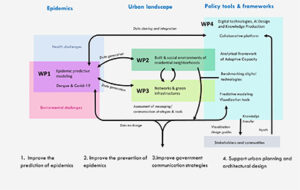Hosted by CNRS@CREATE, the SPACE (Shaping Public Adaptive Capacity For Environmental Infectious Diseases) program aims to develop a dynamic and adaptive approach to urban sustainability.
 The SPACE project aims to develop a dynamic and adaptive approach to urban sustainability. The project builds on analyses of the risk factors and socio-spatial patterns that drive dengue transmission in Singapore, as well as the social and technical skills developed by individuals, community groups and state actors in response to the spread of the disease. The project uses the concept of “adaptive capacity” (AC) to explore the potential of community “latent social capital” as a key asset for adaptive responses to dengue-related health challenges as it interacts with COVID-19 in the context of Singapore’s “Smart Nation” initiative.
The SPACE project aims to develop a dynamic and adaptive approach to urban sustainability. The project builds on analyses of the risk factors and socio-spatial patterns that drive dengue transmission in Singapore, as well as the social and technical skills developed by individuals, community groups and state actors in response to the spread of the disease. The project uses the concept of “adaptive capacity” (AC) to explore the potential of community “latent social capital” as a key asset for adaptive responses to dengue-related health challenges as it interacts with COVID-19 in the context of Singapore’s “Smart Nation” initiative.
Led by Natacha AVELINE-DUBACH, research director at CNRS and member of the UMR Géographie-cités, this four-year project (2022 – 2025), with a budget of 3.6 million euros, brings together several partners in addition to CNRS@CREATE: Nanyang Technological University (NTU Singapore), National University of Singapore (NUS), Singapore University of Technology and Design (SUTD), Singapore Humanities and Social Sciences University (SUSS), Singapore Management University (SMU). CREATE is located in the National University of Singapore’s University Town (NUS U-Town), close to Singapore’s other high-tech hubs such as Biopolis, Fusionopolis, and the science parks.
 A first meeting of the project partners was held in August 2022 at the Condorcet Campus.
A first meeting of the project partners was held in August 2022 at the Condorcet Campus.


